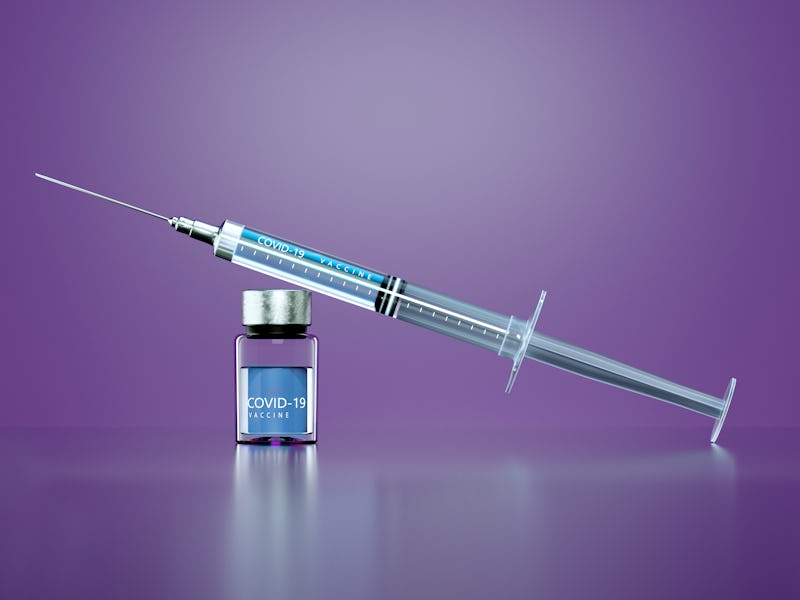Guillain-Barré syndrome: Why experts are still “confident” in J&J
The chances of developing the syndrome are very small; the chances of dying from it are even smaller.

When news broke early this week that there was a possible association between the Johnson & Johnson Covid-19 vaccine and rare neurological disorder, people were understandably alarmed. Around 12.5 million people in the United States have received the one-dose vaccine; that’s roughly 8 percent of the fully vaccinated people in the United States.
But despite how it may sound, experts aren’t terribly alarmed about the development. Yes, the FDA is adding a warning about the syndrome, called Guillain-Barré syndrome, to the vaccine’s fact sheet. But there are no plans to stop using the shot.
Out of the over 12 million people who have received the vaccine, there are roughly 100 cases that may be associated with the syndrome.
Amesh Adalja, an infectious disease expert and senior scholar at the Johns Hopkins University Center for Health Security, tells Inverse, “Most doctors are taking care of Guillain Barre syndrome cases, but they're not a frequent occurrence. They do have a regular baseline rate. That's how [doctors] noticed this aberration, it was above the baseline.”
Here’s everything you need to know about Guillain-Barré syndrome, your risk of developing it after getting the Johnson and Johnson Covid-19 vaccine, and what we know about the prognosis of people who have the syndrome.
What is Guillain-Barré syndrome?
Guillain-Barré syndrome (GBS) is a rare neurological disorder in which the body’s immune system attacks the network of nerves located outside of the brain and spinal cord. Cases can range from mild, with a person experiencing brief periods of weakness, to serious cases that result in paralysis that leaves the person unable to breathe independently, sometimes resulting in death.
What causes Guillain-Barré syndrome?
The National Institute for Neurological Disorders and Stroke says “The exact cause of GBS is not known. Researchers don’t know why it strikes some people and not others. It is not contagious or inherited.”
That said, we know that GBS can develop in the days or weeks following respiratory and viral infections, surgery, and in rare cases, vaccines. There have been reports of people developing GBS after contracting Covid-19, but it’s also associated with the Zika virus.
How many people get Guillain-Barré syndrome every year?
According to the CDC, every year, between 3,000 and 6,000 people in the United States develop GBS. The cases that are associated with the Johnson & Johnson vaccine represent a 1 to 3.6 percent increase.
What is the prognosis for people who have Guillain-Barré syndrome?
Seventy percent of people with GBS eventually make a full recovery. “There are specific treatments [doctors] can do for [GBS] and those tend to be effective,” says Adalja. “Right now, we don't have any reason to think that would be different for these particular cases.”
Of the 100 people who developed GBS after getting the Johnson and Johnson vaccine, one person died.
Close up view of a Janssen/ Johnson and Johnson Covid-19 vaccine ready to be used on June 25, 2021 in Nieuwegein, Netherlands
Now that medical professionals are aware of the possible association between the Johnson & Johnson vaccine and GBS, physicians are likely to intervene early.
“Clinicians are now aware [of the possible connection], and I think it should give people some confidence,” he says.
What is the likelihood of contracting Guillain-Barré syndrome from the Johnson & Johnson vaccine?
While it’s too soon to definitively say that the jab is causing these cases, given what we know about what triggers GBS, it’s certainly possible. On Tuesday, the FDA said in a statement, “Although the available evidence suggests an association between the Janssen [Johnson & Johnson] vaccine and increased risk of GBS, it is insufficient to establish a causal relationship.”
Regardless of the inciting event, the people most at risk for developing GBS are people over 50. Most of the cases associated with the Johnson and Johnson vaccine occurred in men over the age of 50.
To put the risk in context, if 100 cases out of 12.5 million shots remain constant (1 in 125,000), the risk of dying in a car crash (1 in 107) or being killed by a dog attack (1 in 86,781) is much higher.
Is the Johnson & Johnson vaccine safe?
For the vast majority of people, the Johnson and Johnson vaccine appears to be safe and provides decent protection against developing serious cases of Covid-19.
That said, this is the second potential health complication connected to the vaccine. While in both cases, the chances of developing these risks are very small, in a fairly vaccine-hesitant country, this development may mean even fewer people get this particular shot.
Importantly, neither of the mRNA vaccines — Moderna or Pfizer — have been connected to cases of GBS or blood clots.
The fact that the potential association between the Johnson and Johnson vaccine and GBS came to light so quickly should be reassuring, Adalja says.
“It should give people confidence that the vaccine safety monitoring system is so is sensitive enough of these types rare occurrences are getting picked up,” he explains. “And when these things occur, that they get, they get very rapidly disseminated to the public and to clinicians.”